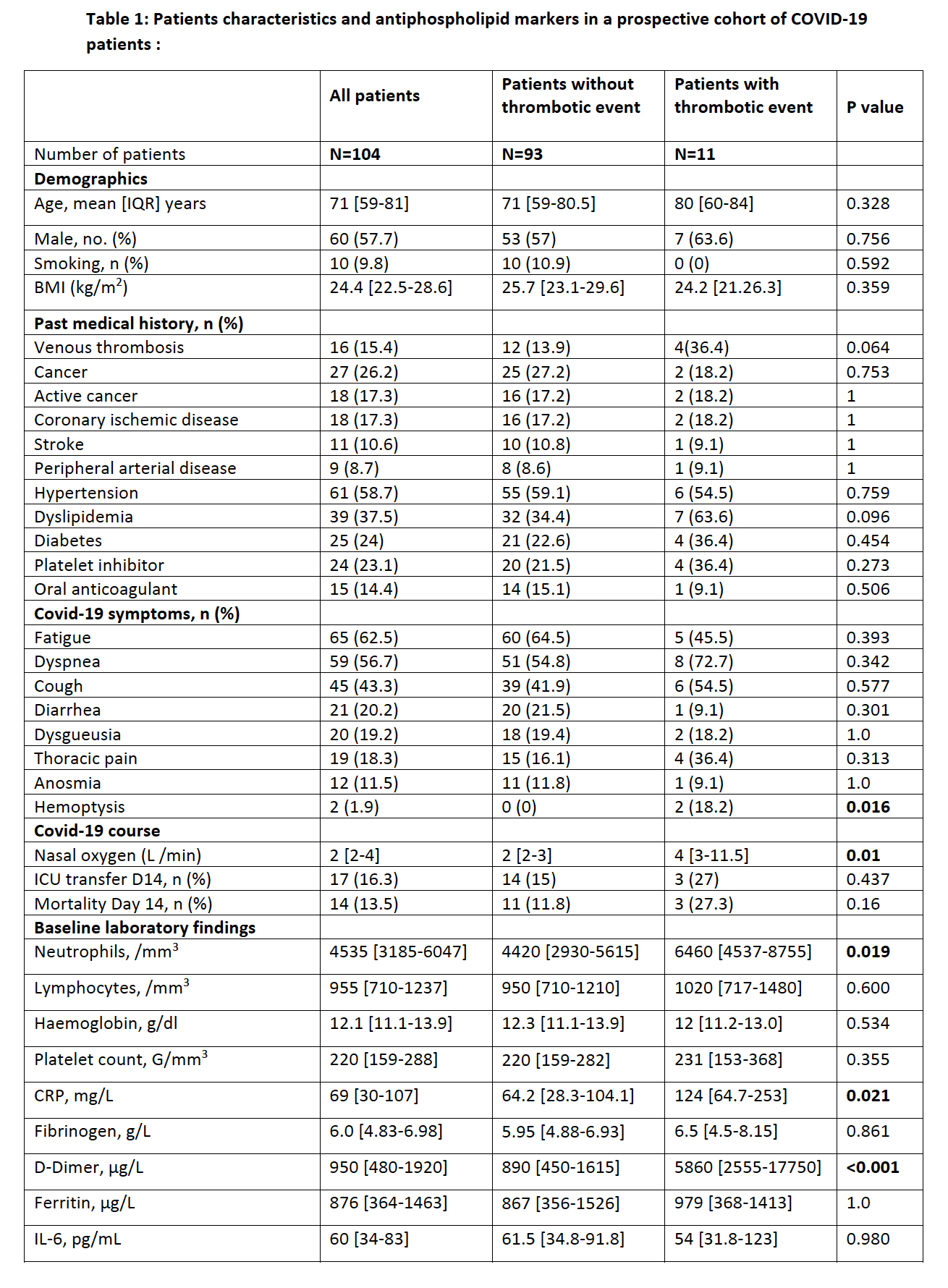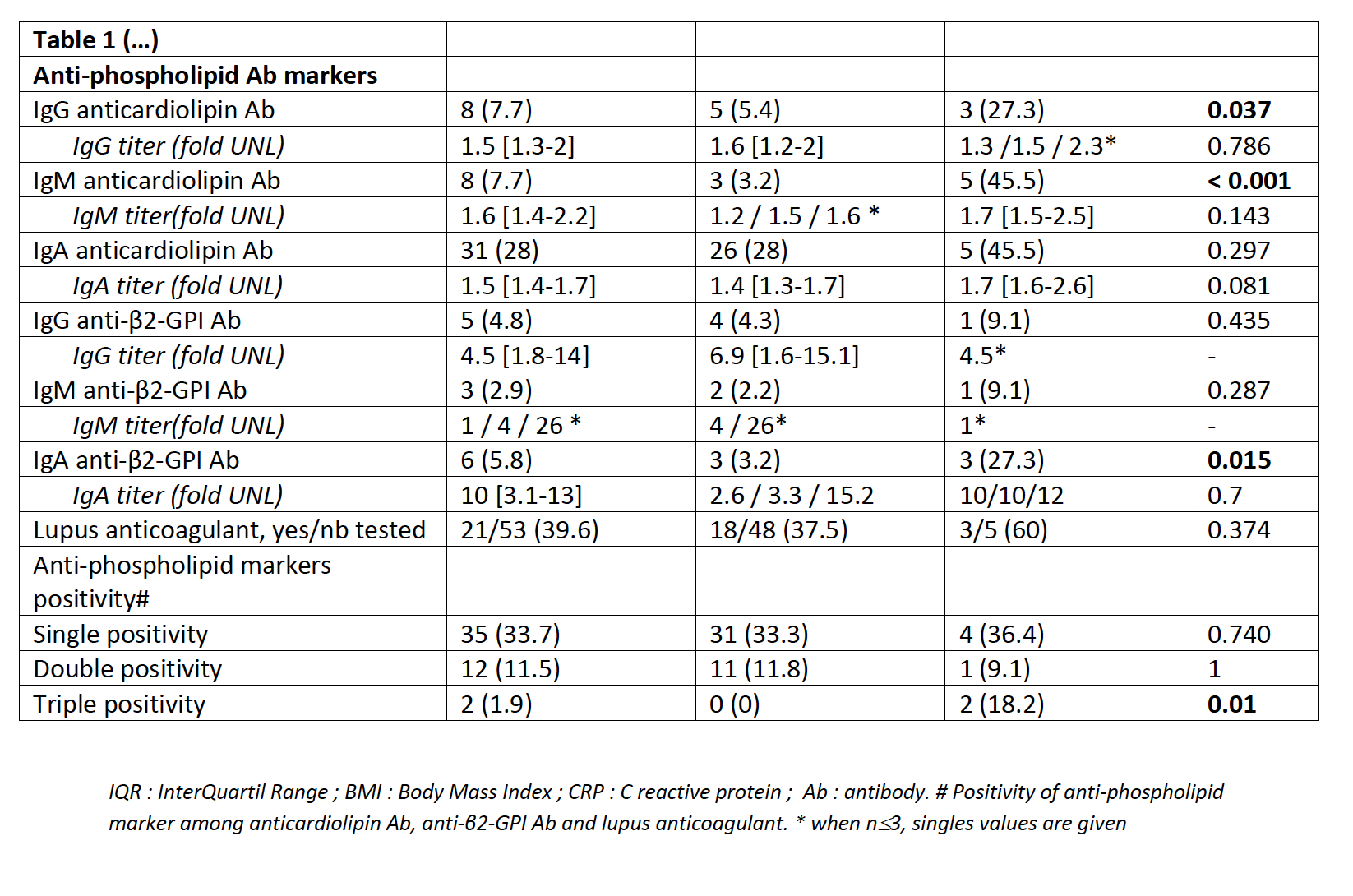Session Information
Session Type: Poster Session B
Session Time: 9:00AM-11:00AM
Background/Purpose: A high prevalence of thrombotic events has been reported in critically ill COVID-19 patients but data on the prevalence of thrombosis in ward patients are scarce. The presence of antiphospholipid antibodies (aPL) and whether aPL are involved in the risk of thrombosis in this setting has not been addressed.
Our objective was to study the prevalence of aPL in non-ICU COVID-19-patients and their relationship with thrombotic events.
Methods: This is a prospective single-center observational cohort study of COVID-19 patients admitted in the Internal Medicine and Clinical Immunology Department of a tertiary care university hospital (Paris, France). Included patients were older than 18 years with an initial requirement for hospitalization in a medical ward and a positive SARS-CoV-2 RT-PCR assay from nasal swabs. Patients were tested for the presence of aPL antibodies. Limit of positivity was fixed at 15 and 10 units/mL (99th percentile of a control population) for aCL and aβ2GPI antibodies respectively. Continuous variables are presented as median (interquartile range, IQR) and were compared using Wilcoxon’s- test. Categorical variables are presented as count (percent) and were compared using Fisher’s-test.
Results: A total of 104 patients (57.7% males, 71 years) were included. Eleven (10.6%) patients had a thrombotic event (9 acute pulmonary embolisms, 1 deep vein thrombosis and 1 aortic thrombus). They had more frequently a history of venous thrombosis, and increased C- reactive protein and D-Dimer levels versus patients without thrombotic events. Overall, 49/104 (47.1%) patients had a least one positive aPL marker while double or triple antiphospholipid seropositivity was found in 11.1% and 1.9%, respectively. Anticardiolipin (aCL) and anti-beta2 glycoprotein I (aβ2GPI) were noted in 35/104 (33.7%) and 9/104 (8.7%) patients. A lupus anticoagulant was found in 21 out of 53 (39.6%) patients. IgG aCL, IgM aCL, IgA β2-GPI and triple positivity were significantly associated with the occurrence of thrombotic events (details are shown in table 1).
If we consider only highly positive aPL (cut off > 30 U/mL), 27/103 (26.2%) non-ICU patients had at least one positive aPL [5/11 (45%) vs 22/91 (24%) patients with or without thrombosis, p=0.051]. The presence of at least two positive aPL ( >30 U/ml) was associated with thrombosis [3/11 (27.3%) vs 1/93 (1.1%), p =0.003].
Conclusion: Although aPL are frequently found in Covid-19 non-ICU patients, their role in thrombotic events needs dedicated studies.
To cite this abstract in AMA style:
Le Joncour A, Frere C, Martin-Toutain I, Gougis P, Ghillani-Dalbin P, Maalouf G, Vieira M, Marcelin A, Salem J, Allenbach Y, Saadoun D, Benveniste O, Cacoub P. Antiphospholipid Antibodies and Thrombotic Events in COVID-19 Patients Hospitalized in Medicine Ward [abstract]. Arthritis Rheumatol. 2020; 72 (suppl 10). https://acrabstracts.org/abstract/antiphospholipid-antibodies-and-thrombotic-events-in-covid-19-patients-hospitalized-in-medicine-ward/. Accessed .« Back to ACR Convergence 2020
ACR Meeting Abstracts - https://acrabstracts.org/abstract/antiphospholipid-antibodies-and-thrombotic-events-in-covid-19-patients-hospitalized-in-medicine-ward/


